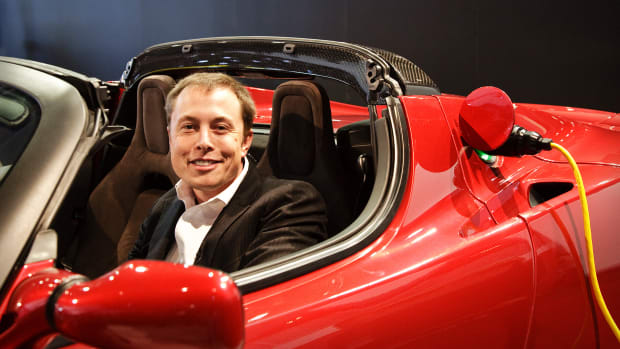Elon Musk's Tesla Roadster has claimed the title as "quickest car in the world," according to its website.
The 2022 Tesla Roadster has good credentials to claim to be the quickest electric vehicle as its specs say it accelerates from 0 to 60 miles per hour in 1.9 seconds, can reach speeds over 250 miles per hour with about 288 horsepower. It also has a range of about 620 miles.
All that and it will cost you an estimated $200,000 to $250,000 to drive away with one of these flashy vehicles.
Three competing electric vehicles seem to finish ahead of the Tesla Roadster in speed estimates, according to a recent CAR Magazine report. The fastest to 60 mph, however, is a McMurtry Spierling that was built in Britain that travels 0 to 60 mph in 1.5 seconds, but only has a top speed of 150 mph. But that vehicle is not for sale.
The Aspark Owl comes in second in acceleration speed, clocking 0 to 60 mph in 1.69 seconds with a top speed of 249 mph. The McMurtry Spierling might be "priceless" but the Aspark Owl is quite expensive at £2.5 million ($2.97 million).

James Leynse/Corbis via Getty
New Tesla Rival Rolls Off Production Line
The latest competitor to Tesla's claim of quickest car just rolled its first EV off the production line on July 12, as the Croatia-based Rimac Nevera produced a demonstrator and marketing vehicle that is the first of 150 models to be produced. These vehicles take five weeks to build on the final assembly line, while many of its parts and systems are made many months prior at Rimac facilities, according to a company statement.
The Rimac Nevera hypercar clocks 0 to 60 mph in 1.85 seconds, reaching 256 mph with enormous 1,914 horsepower, the statement said. The EV took five years of development and testing, three generations of powertrain technology, 18 prototypes, 45 physical crash tests and more than 1.6 million collective hours of research and development to get the vehicle on the road.
The EV maker will deliver these vehicles to its global network of 25 official dealer partners across the U.S., Europe, Middle East and Asia, the statement said. The price estimates run from about $2.27 million to $2.5 million.
“At the beginning of the Nevera journey, we ran thousands of virtual simulations and experimented with countless designs before eventually, the time came to create the very first working prototypes," Mate Rimac, CEO of Rimac Group, said in a statement. "At this time, around 300 people were working in the company, and now as we enter full production, our company has grown five-fold to have over 1,500 colleagues and construction is well underway for our new 100.000 m² (1.07 million square feet) Rimac Campus."
Rimac's competition with Tesla is growing as the Croatian company is developing a battery module to rival Musk's company's 4680 battery technology that is used in its Model Y EVs, according to CarBuzz. Tesla's 4680 batteries are 46 millimeters in diameter and 80 millimeters in height and have shown to speed up charge times.
Rimac is developing its battery module with a similar 46 mm diameter which has greater energy density and fewer cells than older batteries. Rimac reportedly supplies various automakers with batteries and looks to increase the amount of battery packs available for automakers from 40,000 in 2023 to 200,000 in 2028.







